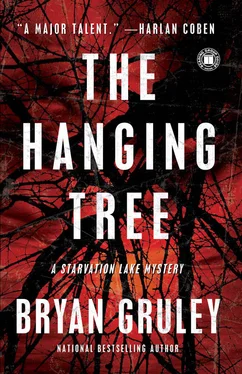Bryan Gruley - The Hanging Tree
Здесь есть возможность читать онлайн «Bryan Gruley - The Hanging Tree» весь текст электронной книги совершенно бесплатно (целиком полную версию без сокращений). В некоторых случаях можно слушать аудио, скачать через торрент в формате fb2 и присутствует краткое содержание. Жанр: Триллер, на английском языке. Описание произведения, (предисловие) а так же отзывы посетителей доступны на портале библиотеки ЛибКат.
- Название:The Hanging Tree
- Автор:
- Жанр:
- Год:неизвестен
- ISBN:нет данных
- Рейтинг книги:3 / 5. Голосов: 1
-
Избранное:Добавить в избранное
- Отзывы:
-
Ваша оценка:
- 60
- 1
- 2
- 3
- 4
- 5
The Hanging Tree: краткое содержание, описание и аннотация
Предлагаем к чтению аннотацию, описание, краткое содержание или предисловие (зависит от того, что написал сам автор книги «The Hanging Tree»). Если вы не нашли необходимую информацию о книге — напишите в комментариях, мы постараемся отыскать её.
The Hanging Tree — читать онлайн бесплатно полную книгу (весь текст) целиком
Ниже представлен текст книги, разбитый по страницам. Система сохранения места последней прочитанной страницы, позволяет с удобством читать онлайн бесплатно книгу «The Hanging Tree», без необходимости каждый раз заново искать на чём Вы остановились. Поставьте закладку, и сможете в любой момент перейти на страницу, на которой закончили чтение.
Интервал:
Закладка:
“Impressive,” he said. “Would that all of us in Starvation think so hard about what we’re doing.”
“Hey, Parm,” I said. “I wish I knew what I was doing. How are you?”
“Staying busy.” He peeled the leather glove off of his right hand and extended it. “I am very sorry for your loss.”
I knew he meant it. “Thanks. Mom’s taking it pretty hard.”
“These sorts of things are never easy,” he said, and he meant that too. He slipped his glove back on. “Please extend my sincerest condolences.”
“I will, thanks. Did you see Gracie’s mom?”
The question took him by surprise. He folded his arms behind his back and leaned slightly forward, a polite smile on his face. Parmelee Gilbert was nothing if not polite. As Laird Haskell’s lawyer, he never failed to return my calls and politely decline to comment or to make his client available for questions.
“Shirley McBride?” he said. “I did speak with her, yes.”
“Ah, sorry,” I said. “Attorney-client privilege?”
He stood straight again, and peered past me down the street. “Would you care for a cup of tea?”
Twin mugs of tea steeped on coasters on Parmelee Gilbert’s desk. He sat in a leather chair behind the desk and lifted each of his legs to strip the slickened rubbers off his wingtips. The shoes gleamed with what I assumed was that morning’s polish. “I apologize,” Gilbert said, while setting the rubbers on a rug, “that I haven’t had you in before.”
From the straight-backed chair facing his desk, I could have laughed without being rude. Gilbert himself might have laughed with me. He had so thoroughly stonewalled me on my Haskell stories that I had almost given up on calling him. Of course I couldn’t actually give up; I had to keep trying, at least so I could tell the faithful readers of the Pilot that I had. Each time I called, he would thank me for calling with my “pertinent questions,” ask me to give his best to my mother, and promise to get back to me “with the clearest possible response I can offer.”
And then, invariably, he would call me at 5:40 p.m., twenty minutes before my deadline, to say, “We’re sorry, but Mr. Haskell prefers not to discuss these matters in the press” or “With our apologies, Mr. Haskell is focused exclusively on the positive aspects of this extremely vital project for Pine County and Starvation Lake.” He was a lawyer representing a lawyer. Sometimes I would wonder: Did Gilbert think at all like Haskell? Did he envy Haskell’s success? Or envy Haskell himself?
Gilbert always thanked me yet again for giving his client-never him, always his client-the opportunity to comment. He always declined, no matter how or how many times I asked, to say anything further. To my occasional attempts to get him to guide me one way or the other on an off-the-record basis, he would merely say, “With all due respect to you and your colleagues, in my experience there is no such thing as off the record.”
I knew reporters at my old paper, the Times, and our rival, the Free Press, who would have been pleased, even relieved, to have Gilbert’s nonresponse; it’s so much easier and quicker five minutes before deadline to insert “ so-and-so declined to comment ” than to have to shoehorn in a last-minute point-by-point rebuttal of every fact and nuance in your story without making it a he-said, she-said jumble that threatened readers with whiplash. “ No comment ” made a reporter’s job simpler. Unfortunately, simpler had never had much appeal for me. If I had preferred simpler, I never would have left Starvation, never would have gambled away my job in Detroit, never would have left the blessed sinecure of my crease and goalposts and mesh to play wing.
I had to grudgingly respect Parmelee Gilbert for refusing to go off the record. He was correct, of course, that there was no such thing. There was fact and there was fiction and it didn’t matter whether you said it was “according to a person familiar with the matter” if the person supposedly familiar was lying or ignorant or stupid. I had known plenty of lawyers and flacks who viewed off the record as an opportunity to dissemble and obfuscate. Gilbert hadn’t been terribly helpful, but at least he’d been honest in his unhelpfulness. So I didn’t laugh when he apologized for not having me in before.
“You’re doing your job,” I said. “I just figure you could bill a lot more hours by actually answering my questions.”
He smiled. “Milk? Sugar?”
“A little of both, please.”
While he finished preparing the tea, I looked around. For a lawyer who had hung his cedar shake shingle on Main Street for more than thirty years, Gilbert’s career mementoes were scant. Framed degrees from Michigan Tech, a bachelor’s in American history, and the University of Detroit law school decorated the otherwise empty wall to my left. A hot plate rested on the windowsill behind him. On his desk was a telephone, two pens and two sharpened pencils lined up alongside one another, and a blotter calendar neatly jotted with appointments and reminders. On my right, a waist-high bookshelf was lined with law tomes and a few slim editions of a book, Ghost Towns of Michigan.
Atop the shelf stood a photograph of a smiling girl in braces and pigtails entwined with white ribbons. She was wearing a cheerleader’s blue sweater embroidered with an interlocking “P” and “C” for Pine County High. Her name, I knew, was Carol Jo Gilbert. Had she lived, she would have been in her mid-forties.
When the girl was fourteen, her mother, Gilbert’s wife, had taken her downstate on an annual Christmas shopping trip. They went from store to store in the big Northland Center mall north of Detroit, stopping as always at Sanders for lunch. The mother left Carol Jo to finish a chocolate soda while going to a pay phone to let her husband know they were having fun.
Carol Jo wasn’t seen again until the ice melted on a pond near Harbor Beach where her killer had dumped her. I remembered hearing about it as a boy, the hushed, anxious whispers, the shaking heads and furrowed brows, while eating breakfast at Audrey’s with my mother. Carol Jo’s killer was never found.
Two months after Carol Jo was buried, her mother, who had not been seen outside the Gilbert home since the funeral, showed up at Sunday Mass in the middle of the priest’s homily. Mom and I, sitting in the front row, heard the murmur rising in the pews behind us and turned to see Mrs. Gilbert, in a wrinkled flannel shirt with the tails out, walking purposefully up the center aisle. She stopped in front of the communion rail. From the lectern astride the altar, Father Emmett gave her a sideways glance but continued with his sermon.
Her first scream stopped him. You have nothing for me, she yelled. She raised an arm and pointed at the tabernacle. You have nothing but death. Father Emmett stepped away from the lectern toward Mrs. Gilbert- Mary Jo, he said-but she kept up her wail as if he weren’t there, as if none of us were there. You are nothing. You are nothing but death.
Darlene’s father and two other men came out from their pews and tried to take Mary Jo Gilbert by the shoulders and settle her down but she pushed them away and continued her keening. Father Emmett hopped over the communion rail and approached her with his hand out, palm down, as if to bless her, but she slapped his hand away. I turned and watched the men drag her down the aisle until my mother twisted me around and told me to mind my own business.
Late that night, Parmelee Gilbert called the police to say his wife had gone to the grocery store hours before and had not come home. Early the next morning, two officers appeared on Gilbert’s front doorstep on Ambling Street. They told him his wife had been found in the woods a mile north of the lake. She had used a garden hose to feed the tailpipe exhaust back into her car. After burying Mary Jo, Parmelee Gilbert sold the home where the three of them had lived and bought another house two blocks away.
Читать дальшеИнтервал:
Закладка:
Похожие книги на «The Hanging Tree»
Представляем Вашему вниманию похожие книги на «The Hanging Tree» списком для выбора. Мы отобрали схожую по названию и смыслу литературу в надежде предоставить читателям больше вариантов отыскать новые, интересные, ещё непрочитанные произведения.
Обсуждение, отзывы о книге «The Hanging Tree» и просто собственные мнения читателей. Оставьте ваши комментарии, напишите, что Вы думаете о произведении, его смысле или главных героях. Укажите что конкретно понравилось, а что нет, и почему Вы так считаете.












